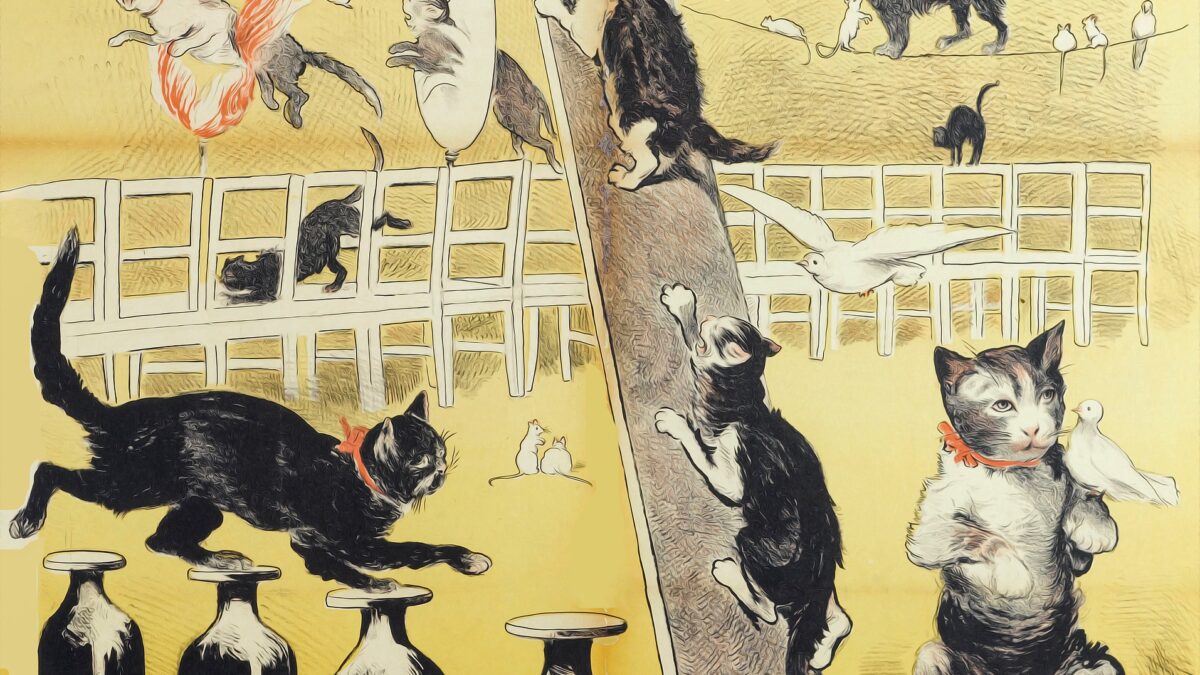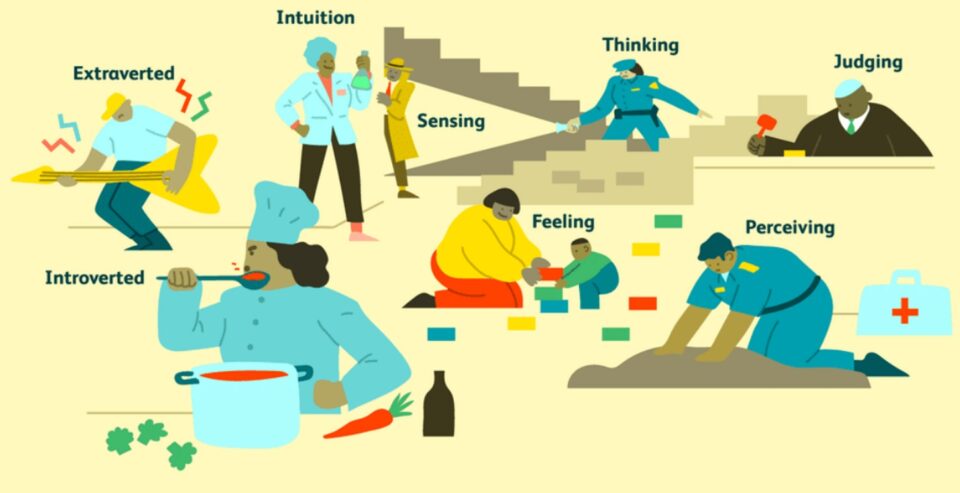Herding Cats, and other UU Humor

Herding Cats, and other UU Humor
Rev. Dr. Tony Larsen
May 21, 2023
Clergy through the centuries have often been called pastors ("pastor," after all, being the Latin word for "shepherd"). And a congregation has often been called a flock. (In fact, at the last church I served, the church recipe book that we used as a fundraiser was called "Favorites of the Flock.")
Yet sheep have the reputation of being, well, easily led, and (dare I say) sheepish. And since we Unitarian Universalists tend to take pride in our independent views--and don't believe something just because a minister told us so--we tend to bristle a little at being called a flock of sheep. So, if we're not a flock of sheep, what other metaphor might we use?
Well, some years ago someone came up with the expression: "Trying to lead a group of UUs…is like trying to herd cats." It occurred to me that it might be interesting to look at some of the jokes and metaphors people use to describe us (and that we ourselves sometimes tell about ourselves)--and see what truth there may be in some of those expressions. (And what misconceptions too.)
…the 4 elements of religious jokes…
The cat metaphor may be particularly instructive in this regard. Like almost all jokes about UUs, the herding-cats one has 4 elements that I'm aware of:
1) truth, 2) falsehood, 3) humility, 4) pride.
1) There's a truth there--UUs do tend to be independent thinkers, so herding cats is an appropriate metaphor.
2) There's a falsehood, or misconception, in that the herding-cats metaphor could lead you to think that UUs can't cooperate on anything, when clearly we can–and do! (So it's at the very least an exaggeration.)
3) There's an element of making fun of ourselves, in that we're admitting to a certain streak of stubbornness. We're saying, in effect, that we may be too cantankerous for our own good. (And that seems to be a case of humility, or self-deprecation.)
But 4) There's a bit of pride there under that seeming self-deprecation. Because we're saying that yes, it may be hard to get us to all agree on one thing, but that's because we're so smart--we think things out. And we're open-minded--we're willing to consider different points of view. And we're nonconformists--we don't just run with the crowd.
I submit that almost all the jokes we tell about Unitarian Universalists have these 4 elements: 1) they tell a truth; 2) they tell a lie (at least in the sense of an exaggeration); 3) they make fun of ourselves (so they seem to be expressions of humility); but 4) that self-deprecation, if you unmask it a little, contains a certain pride, and sometimes maybe even a feeling of superiority.
…UUs as over-educated…
Consider this one: It is sometimes said that Unitarian Universalism is a church for the over-educated.
Now, there's a particle of truth in that because, if you look at statistics, UUs have (on average) more formal education than the members of any other denomination (including the Episcopalians!).
The misconception is that you don't have to be formally educated to be a UU; and, in fact, the problem with this saying is that it gives the impression that we're a religion for only the elite. (And that misconception may contribute to the fact that we've never truly succeeded in being the diverse faith we say we want to be--in both beliefs and demographics.)
Now, there is a humility part, of course, in saying we are over-educated (because almost everyone is familiar with the academic expert who has book knowledge in some narrow field but has no common sense). Still, there's a self-congratulatory aspect here too, because if you're going to be "overly" something, overly educated sounds pretty good, right?
…UUs as an ushering test...
Probably one of the best tellers of UU jokes (at least on Public Radio) was Garrison Keillor on his "Prairie Home Companion" show. In one of his tales of Lake Wobegon he talked about an usher-training school that Catholic and Lutheran ushers attended together. And the final test at this school for graduating ushers--the one way to prove they really knew how to do a difficult job--was for them to get a group of Unitarians to sit down. (If you could do that, he said, then you graduated from usher-training school.)
Again, it has those 4 elements: 1) it has a sense of truth to it, though 2) it's clearly an exaggeration; and 3) it makes fun of UUs as being unruly, yet 4) we ourselves laugh at it because we're secretly proud of not being sheep.
…“wherever 2 or 3 UUs are gathered”...
Here are a couple other expressions along the same lines: "Wherever 2 or 3 UUs are gathered together..." (Now, you're primed for the Gospel passage [Matt. 18:20] where Jesus says, "Wherever 2 or 3 are gathered together in my name, there am I in the midst of them"--but there's a surprise): "Wherever 2 or 3 UUs are gathered together, there will be 5 or 6 opinions among them." 1) Some truth 2) some exaggeration 3) some self-deprecation 4) but secretly pride.
…what UUs learn in theological school...
Here's a UU joke that I came up with some years ago (and it was later published in a book on UU humor). A fellow clergyperson once asked me, "What do Unitarian Universalists learn in their theological schools?" And before I could even think about it, I blurted out, "Oh, we learn the same things you do. We're just taught not to believe any of it."
Again, that's got those 4 elements: 1) We do learn the same things most other seminaries teach, that's true (and, in fact, more UU students go to non-UU seminaries than to UU schools). But 2) It's an exaggeration to say we're taught not to believe any of it--because, although we are told we don't have to believe any of it, we're never told we can't. No. 3) We appear to be making fun of ourselves because, after all, it would seem silly to spend all this time learning things that you don't think are true. But 4) There's a certain pride here: We're saying, "We know all the same things you do, but we know better than to believe any of it."
So, truth, lie, humility, pride.
…Billy Graham’s bible blaster...
Another one along this vein was a gag in the TV show "The Simpsons." One episode had a group of kids playing a game called "Billy Graham's Bible Blaster." The point of the game was to shoot heathens with Bibles; and if you did, you'd win points for saving them. And one kid shoots his Bible at a heathen and says, "I got him!" But the other player says, "No, you just winged him. Now he's a Unitarian." The fact that UUs themselves love this story--and repeat it frequently--shows that, although it seems to mock us, we actually take a certain amount of pride in the joke.
…UUs and the Lord’s Prayer...
I remember a joke I once told to the high-school group at the church I used to serve. "There were 2 Unitarians talking. One said to the other, 'I bet you can't recite the Lord's Prayer.' And the second one says, 'Sure I can.' So the first one says, 'OK, I'll give you $20 if you can say it.' And the second one says, 'You're on. Now I lay me down to sleep, I pray the Lord my soul to keep…’
And the first one says, 'OK, you win. Here's the $20.'"
But you know what's really funny (and maybe a little sad)? When I told that joke to the UU youth group, nobody got it. None of them knew the Lord's Prayer either, so they didn't get the joke.
…a few others…
Here are a few others some of you may be familiar with (or even told yourselves):
Why don't UUs sing very well? Because we're always looking ahead to the next line to see if we agree with it.
One UU comedian said, “In our Unitarian Sunday School, instead of learning the 10 Commandments, we learned the 10 Suggestions.” He also said,”When the Ku Klux Klan burned crosses on other people's lawns, on ours they burned a question mark.”
If you've given up on organized religion, you'll love Unitarian Universalism.
UUs aren't that interested in heaven because they don't like gated communities.
UUs' favorite Christmas movie is "Coincidence on 34th Street." (Coincidence instead of miracle.)
What do you get when you cross a UU with a Jehovah's Witness? Someone who knocks on your door for no particular reason. (Even Jehovah's Witnesses like this joke--though it may give the impression that we have no message worth sharing.)
…heaven…or a discussion about heaven…
One of the oldest chestnuts about UUs (going back to before the Unitarians merged with the Universalists in 1961) is the story of the Unitarian who dies and meets St. Peter at the Pearly Gates. Peter is surprised to see him there and says, "Didn't you see the signs as you came up that path?" The Unitarians says, "No, I must have missed them." And Peter says, "That explains it then. There's a fork in the road with two signs. One of them says 'This way to heaven.' The other says 'This way to a discussion about heaven.' Most Unitarians choose the discussion."
(Again, this one's got a mixed message. It's true that we are interested in discussion, since we question things; but, given the choice of experiencing something... or just talking about it, would you really choose talking it to death?)
…not a new phenomenon...
By the way, for anyone thinking that joking about religion is a new thing, it's actually a very old and venerable tradition. We know from records of the Universalist Magazine in the early 1800s that Universalists were telling humorous anecdotes and stories about themselves and other religions 200 years ago. In a section of the magazine devoted to "original anecdotes," there was a story about some Universalist kids who were invited to a Methodist church by some of their friends. Now, in those days, Methodist preachers talked a lot about hell, and about how many people were awaiting damnation if they didn't repent in time. Whereas, Universalist churches, of course, didn't talk about that because they believed everyone would be saved. (That's what Universalism originally meant: universal salvation.) So the story in the Universalist Magazine said these Universalist kids went to a Methodist church, and when they got home their mother asked them what they had learned there. And, as the mother described it: My "little son between five and six years old looking very earnestly in [my] face said, 'Ma'am, did you ever hear a man swear so in all your life!'"
You see, for a Universalist child, going to a church where the minister kept talking about hellfire and damnation... would seem to be a church with a bunch of swearing.
…the difference between Unitarians and Universalists…
And then there was the Universalist minister Thomas Starr King, who became a Unitarian minister (long before the 2 denominations merged). When he was asked what's the difference between the Unitarians and the Universalists (since he had been both), he said, "There's not much difference. [The Universalists] believe God is too good to damn them. And [the Unitarians] believe they're too good to be damned."
Now, we're not the only ones who joke about religion. The Episcopal church used to use an ad for their faith that went: "The Episcopal Church welcomes you, regardless of race, color, or number of times you've been born."
…humor and spirituality…
Now, why have I talked about this today? Well,one reason is that humor has a lot in common with spirituality. They are both difficult to explain in words. If you tell a joke and someone doesn’t “get” it, you can explain the joke. But it’s lost its humor by then. Likewise, you can’t really explain your spirituality to someone who hasn’t experienced it.
I mean, how do you explain things like “ah!”--the awe you feel at a beautiful sunrise or at the stars in a night sky? How do you explain the “aha” you experience, when you finally understand something you never got before?
The “ah” of wonder and the “aha” of insight have a lot to do with the “ha-ha” of humor. None of them can be completely understood with rational thought. They have too many layers for that. They can only be experienced: ah…aha…ha-ha-ha.
So humor has a lot in common with spirituality… and discovery, or insight. And it can be healing. As the Catholic poet G. K. Chesterton once said: “It is the test of a religion, whether you can joke about it.” And, from Elton Trueblood: “Never trust a theologian who doesn’t have a sense of humor.
…what our humor sometimes reveals…
But the other reason I’m talking about this today is that the jokes we tell (and that others tell about us) sometimes reveal more than we realize. So it can be helpful to pay attention to what they're saying and what they're not saying. What do they reveal about our assumptions--both about ourselves and about other people?
You see, even well-intentioned jokes can be misleading. Like this old joke: What do you call a dead Unitarian? Someone who's all dressed up with no place to go.
Again, it's humorous, and it would apply to humanist UUs--but do we really want to imply that no belief in afterlife is allowed in our churches? This joke does give that impression.
Another: Some people say that Unitarian Universalists are just "agnostics with kids."
There's a bit of truth there--a number of agnostic parents do come to our churches because they want their kids to get a broad religious education without being indoctrinated. But this description--as humorous as it may be--could give the impression that people who believe in God are not welcome here. And that's not an idea we want to reinforce. [In other words, agnostics are welcome; but so are theists!]
Always be aware of how what you say about your faith may be heard as applying to all UUs, and thus be unintentionally exclusionary. Also remember that not only do the jokes we tell contain a truth and a lie [that's #1 and #2 in this chart]--they also contain humility and pride [that's #3 and #4]. Or, you could say, they contain self mocking and self congratulating--which are often two sides of the same coin.
Once you realize this, you'll understand why outsiders sometimes see UUs as modest and unpretentious, and sometimes they see us as arrogant or overbearing. I mean, I've heard people who've discovered us say things like: "I just love the way UUs don't take yourselves too seriously; you make fun of yourselves and your religion, you have a sense of humor about it all. And that's so refreshing."
But I've also heard people say, "You people are intellectual snobs. You think you're so superior and that you're more enlightened than everyone else. Only, instead of being 'holier-than-thou,' you're 'more-educated-than-thou.' And it's just as self-righteous." The funny thing here is that people can react to us in these 2 diametrically opposed ways because of the exact same thing they've heard us say and do.
Once you understand that most of our jokes about ourselves contain humility and pride--you'll see why this is so. So, enjoy the jokes. And tell them well. But, through it all, remember that humor almost always has more than one layer of meaning--as, of course, does every human being you will ever meet.
Good luck!



